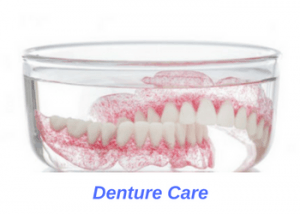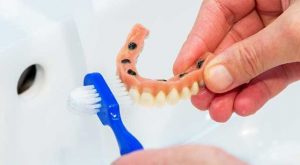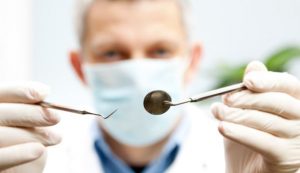Why is it important to care for my dentures?

It's important to care properly for your dentures if you want them to look good and last a long time. Taking good care of your dentures protects your remaining teeth, existing gum structure, and valuable jawbone. Cleaning your dentures regularly prevents food particles from gathering on the false teeth. This prevents your dentures from smelling bad, irritating the gums, and causing sore lesions and infections inside the mouth. It also keeps your dentures looking new and feeling fresh. Well-cared-for dentures last much longer and perform better throughout their lifetime.
How do I clean my dentures?

It's perfectly fine to clean your dentures using a regular toothbrush and liquid soap or other acceptable cleaning solutions
We recommend that you clean your dentures on a daily basis. The best time to clean dentures is after you have just removed them from your mouth. This means that you should clean your dentures at night times or when you're about to put them in your mouth in the mornings. Here are some helpful tips on how to best care for your dentures:
- Clean dentures using a regular manual toothbrush.
- Use liquid soap or other acceptable cleaning solutions to clean your false teeth.
- Avoid toothpaste because toothpaste is abrasive and it scratches and damages false teeth.
- Keep your dentures away from pets and kids.
- When you're not wearing them, store your dentures securely in a designated container.
- Soak and store your dentures in room temperature water and be sure to avoid hot and cold water.
- For even cleaner dentures, use special denture cleaning solutions such as Polydent once a week to remove stubborn calcified particles. Be sure to rinse out the Polydent thoroughly before wearing your dentures again.
Can I sleep with my dentures in my mouth?
No! You should avoid sleeping with dentures in your mouth regardless of what type of dentures you have. Always remove your dentures before going to sleep at night times. Removing dentures gives your mouth, and any remaining teeth, a break. Just like the rest of your body, your mouth needs time to rest. Wearing dentures overnight leads to numerous unwanted problems:
- If you have any remaining teeth, wearing dentures 24/7 stresses the remaining teeth. This increases the likelihood of developing cavities and increases the rate of bone loss surrounding your teeth. Wearing your dentures at night causes you to lose your remaining teeth at a much faster rate.
- Wearing your dentures at night causes you to have red and inflamed gum tissue. It also leads to more sore lesions on the gums and increases the likelihood of developing pain and infection inside the mouth.
- Wearing your dentures around the clock causes accelerated bone loss in your mouth, regardless of whether or not you have any teeth left. This makes your jawbone shrink and become weaker, which ultimately makes your dentures looser over time.
- When you wear your dentures overnight, the teeth wear out at a much faster pace. Your denture teeth become flat, they are more likely to break, and they lose their effectiveness at chewing food particles. In contrast, removing your dentures makes them last much longer while at the same time, they are more efficient at chewing and more enjoyable to wear.
Do I still need to see a dentist if I’m wearing dentures?

You should see the dentist annually, even if you have no more teeth left in your mouth
Yes! You should continue seeing your dentist at least once a year, even if you are wearing full dentures. Keep in mind, dentists do more than just clean and fix your teeth. Your dentist will evaluate your gums, check for pre-cancerous lesions, look for TMJ problems, screen for sleep apnea, and so much more. Plus, your dentist will review how you're caring for your dentures, examine your bite relationship, evaluate the condition of your denture, and make adjustments as needed. Having access to a local dentist could also be very helpful in case you ever damage, break, or lose your denture teeth.
How long do dentures typically last?

Wearing a new set of dentures improves the fit and chewing capability and it enhances your appearance
Most dentures are typically good for three to five years before they need replacement. Even if you take great care of your dentures, they eventually have to be replaced. Why is that? We continue to lose our valuable jawbone every year, especially when we're without any teeth. This causes dentures to become looser and looser each year. Additionally, denture teeth wear flat with repeated use and lose their chewing efficiency. This significantly reduces your ability to eat harder food objects which adversely affects your digestion. Wearing a new set of dentures improves the fit and chewing capability of your dentures. It also enhances your appearance by giving you a whiter and brighter set of teeth.
If you'd like to learn more about how to care for other dental prostheses, click on one of the following links: